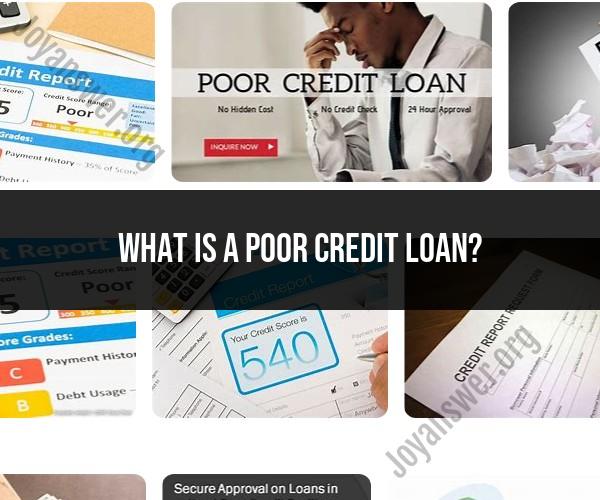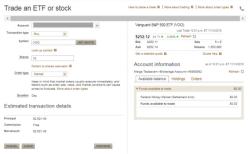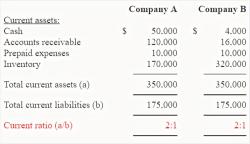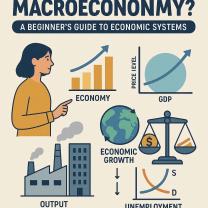What is a poor credit loan?
A poor credit loan, often referred to as a "bad credit loan," is a type of loan designed for individuals with a low credit score or a poor credit history. People with poor credit may have difficulty qualifying for traditional loans or credit cards, and poor credit loans are often seen as a way to access funds when other options are limited. Here are some key features of poor credit loans:
Higher Interest Rates: Poor credit loans typically come with higher interest rates compared to loans offered to individuals with good or excellent credit. Lenders charge higher rates to compensate for the increased risk associated with lending to individuals with poor credit.
Limited Loan Amounts: The loan amounts for poor credit loans are often smaller compared to what someone with good credit might qualify for. This is because lenders want to limit their exposure to risk.
Shorter Loan Terms: Poor credit loans often have shorter repayment terms. Borrowers are required to repay the loan over a shorter period, which can result in higher monthly payments.
Secured or Unsecured: Poor credit loans can be either secured or unsecured. Secured loans require collateral (e.g., a car or valuable asset) to back the loan, while unsecured loans do not require collateral but may have stricter terms and higher interest rates.
Improving Credit: Some individuals use poor credit loans as a means to rebuild their credit. By making on-time payments, they can demonstrate responsible financial behavior, potentially improving their credit score over time.
Varied Lending Sources: Poor credit loans may be available through traditional banks, credit unions, online lenders, or specialized lenders that focus on lending to individuals with poor credit.
Types of poor credit loans include:
- Payday Loans: Short-term loans with high fees and very short repayment terms.
- Personal Installment Loans: Larger, longer-term loans with fixed monthly payments.
- Title Loans: Secured loans using a vehicle as collateral.
- Secured Credit Cards: Credit cards that require a security deposit and are designed for people with poor credit.
It's important to exercise caution when considering a poor credit loan. High-interest rates can make these loans expensive, and they should be used as a last resort. Before pursuing a poor credit loan, explore other financial options, such as improving your credit score, seeking financial counseling, or looking for alternative sources of assistance.
Additionally, be sure to read the terms and conditions of any loan carefully, understand the interest rates, fees, and the impact on your overall financial situation. Always choose reputable lenders, and consider the potential consequences of borrowing with poor credit before proceeding.
What is a poor credit loan, and how does it work?
A poor credit loan is a loan that is specifically designed for people with poor credit scores. Poor credit loans typically have higher interest rates and shorter repayment terms than traditional loans. However, they can be a good option for people with poor credit who need to borrow money quickly.
To apply for a poor credit loan, you will need to provide the lender with your basic information, such as your name, address, and Social Security number. You will also need to provide the lender with information about your income and employment. The lender will then review your credit report and make a decision about whether or not to approve your loan.
If your loan is approved, you will receive the funds in a lump sum. You will then need to repay the loan according to the terms of the agreement. This typically involves making monthly payments over a period of one to five years.
How can you qualify for a loan with poor credit?
There are a few things you can do to qualify for a loan with poor credit:
- Provide a down payment: If you have a down payment, you will be more likely to qualify for a loan and you may be able to get a lower interest rate.
- Get a co-signer: If you have a co-signer with good credit, they can help you qualify for a loan.
- Apply to a lender that specializes in poor credit loans: There are lenders that specialize in making loans to people with poor credit. These lenders may have more flexible qualifying requirements.
What are the potential drawbacks of poor credit loans?
Poor credit loans typically have higher interest rates and shorter repayment terms than traditional loans. This means that you will pay more in interest over the life of the loan, and you will have less time to repay the loan. Additionally, poor credit loans may have other fees, such as origination fees and late payment fees.
It is important to compare different poor credit loans before you choose one. You should compare the interest rates, repayment terms, and fees of different loans to find the best deal.
Can you explain the difference between secured and unsecured poor credit loans?
Secured poor credit loans require collateral, such as a car or a house. If you default on the loan, the lender can seize the collateral. Unsecured poor credit loans do not require collateral. However, unsecured poor credit loans typically have higher interest rates than secured poor credit loans.
Are there alternative options for people with poor credit to access funds?
There are a few alternative options for people with poor credit to access funds:
- Payday loans: Payday loans are short-term loans that are typically repaid within two weeks. Payday loans have very high interest rates and should be avoided if possible.
- Pawn shop loans: Pawn shop loans allow you to borrow money by pawning your belongings. Pawn shop loans typically have high interest rates, but they can be a good option for people who need money quickly.
- Credit unions: Credit unions may be more likely to approve loans for people with poor credit than traditional banks.
- Government assistance programs: There are a number of government assistance programs that can help people with low incomes pay for basic necessities.
If you have poor credit and need to borrow money, it is important to explore all of your options before you choose a loan. You should compare the interest rates, repayment terms, and fees of different loans to find the best deal. You should also consider alternative options, such as credit unions and government assistance programs.













